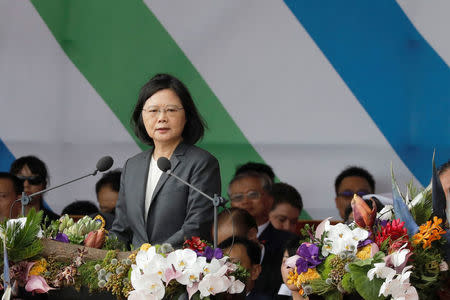Taiwan president visits U.S. territory of Guam despite Chinese ire

By Maureen N. Maratita
HAGATNA, Guam (Reuters) - Taiwanese President Tsai Ing-wen arrived on the U.S. Pacific island of Guam on Friday on her way back from visiting diplomatic allies in the Pacific - a trip that caused strong objections from China, which claims Taiwan as its own.
Beijing had urged the United States not to allow Tsai to transit its territory on her trip, which included two days in Hawaii before she headed on to Tuvalu, the Solomon Islands and the Marshall Islands.
The timing is particularly touchy as U.S. President Donald Trump is due in Beijing next week.
China regards self-ruled and democratic Taiwan as its sovereign territory and regularly calls it the most sensitive and important issue between it and the United States, strongly objecting to transit stops by Taiwanese presidents.
While the office of Guam Governor Edward B. Calvo described Tsai's visit as "private and unofficial", she was provided with a police escort upon her arrival.
Speaking at a banquet, Tsai said that "Taiwan and Guam share a unique friendship."
She described Guam as the "closest part of the United States" to Taiwan, adding: "The people of Taiwan are grateful for your support."
James F. Moriarty, chairman of the American Institute in Taiwan, the U.S. mission in Taiwan, said Hawaii, Guam and Taiwan were bound together not only by the Pacific Ocean but also by "an expectation of democracy."
Guam is home to a large U.S. military base and would be key to any U.S. assistance to Taiwan in the event of a conflict with China. Beijing has never renounced the possible use of force to bring the island under its control.
Relations between Beijing and Taipei have nosedived since Tsai was elected last year; China believes she wants formal independence for Taiwan, a red line for Beijing.
For her part, Tsai says she wants to maintain peace with China but will defend Taiwan's democracy and security.
The U.S. State Department had said Tsai's transits through U.S. soil would be "private and unofficial" and based on long-standing U.S. practice consistent with "our unofficial relations with Taiwan".
Last December, Trump angered Beijing by taking a telephone call from Tsai shortly after winning the presidential election.
Tsai has been in the United States twice this year. In January, she stopped over in Houston and San Francisco on her way to and from Latin America.
(Reporting by Maureen N. Maratita; Writing by Ben Blanchard; Editing by Kevin Liffey)

